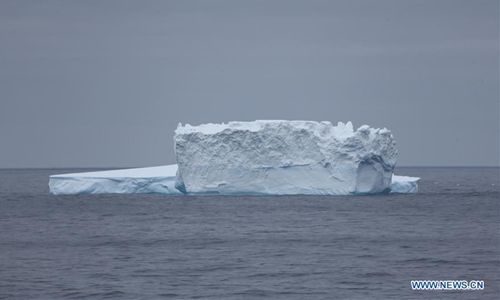Arctic shipping facing COVID-19 headwinds
Source: Global Times Published: 2020/7/28 0:22:21

Photo taken on Jan. 27, 2020 from China's polar icebreaker Xuelong 2, or Snow Dragon 2, shows iceberg in the southern Atlantic ocean westerlies. China's 36th Antarctic expedition team put two buoys into the ocean to acquire scientific data at 55.26 degrees south latitude and 17.56 east longitude. (Xinhua/Liu Shiping)
The prospect and timeline of developing Arctic shipping as an alternative to traditional shipping is at risk of running into rising headwinds from unilateralism, trade protectionism and escalating China-US tensions in the wake of the COVID-19 pandemic, Chinese academics said at a seminar held on Monday."The development of Arctic shipping has been a slow process and COVID-19 has clouded its prospects in the years to come," said Li Zhenfu, a professor with Dalian Maritime University.
While the development of the Arctic region is focused on resources and energy, the arrival of the pandemic has certainly cast a shadow on the prospects of Arctic development at least temporarily, Li said.
Amid the global economic shutdowns, there isn't much demand for energy and major countries in the region are also facing lower financial resources for such development projects.
The Arctic region has oil reserves of 90 billion barrels and natural gas of 47,900 billion cubic meters.
The rising rivalry between China and the US also poses serious challenges to multilateralism, for which the governance of Arctic shipping and development is crucial, experts attending the video conference said.
Russia, the US, Scandinavian countries and China are major countries participating in the development of Arctic shipping routes.
Since global warming has made the water of the Arctic region suitable for shipping during summer time, a total of 31 voyages have been made by COSCO Shipping, reducing shipping time by 395.5 days and carbon emissions by 35,673 tons, data from the Chinese shipping giant showed.
Although it is not an Arctic country, China has advantages in the areas of shipping, ship building and seabed cables that are necessary for the development of the region.
Further improving a shipping network in Northeast Asia with Russia, Japan and South Korea and another network with Russia, Mongolia and North Korea could help solve the bottleneck in the development of Arctic shipping, Li suggested.
Global Times
Posted in: INDUSTRIES